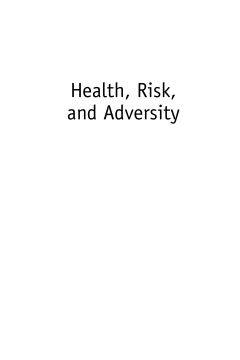
Additional Information
Book Details
Abstract
Research on health involves evaluating the disparities that are systematically associated with the experience of risk, including genetic and physiological variation, environmental exposure to poor nutrition and disease, and social marginalization. This volume provides a unique perspective - a comparative approach to the analysis of health disparities and human adaptability - and specifically focuses on the pathways that lead to unequal health outcomes. From an explicitly anthropological perspective situated in the practice and theory of biosocial studies, this book combines theoretical rigor with more applied and practice-oriented approaches and critically examines infectious and chronic diseases, reproduction, and nutrition.
"[This volume] is very well organized, overall, with a layout ideal for students and academics who are looking to collaborate with their colleagues in anthropology and public health. The chapter structures offer well thought out summaries; a helpful glossary is found in the back. Those curious about human action and inaction as sources of ill health will find adversity and risk’s impact on health clearly and vibrantly displayed through Panter-Brick and Fuentes’ bio-cultural investigation of unequal health outcomes." · Journal of the Bio-Social Society
"These are vibrant and important treatments of socio-cultural concepts in health that fit well into medical anthropology, but also go beyond that. Their contribution lies in reminding and refining how human health and biology are produced, perceived, and communicated in a deep social context that includes history, politics, economics, and current global culture, especially modern media.… The editors have brilliantly organized the volume." · Stephen T. McGarvey, Professor of Community Health and Anthropology, Brown University
Catherine Panter-Brick is Professor of Anthropology at Yale University. Her research focuses on critical risks to health across key stages of human development. She has edited severa books to bridge research findings into teaching practice, such as Biosocial Perspectives on Children (1998), Hormones, Health, and Behavior (1999), Abandoned Children (2000), and Hunter-Gatherers (2001). She is Senior Editor (Medical Anthropology Section) for Social Science & Medicine.
Agustín Fuentes is Professor of Anthropology at the University of Notre Dame, US. His research interests focus on primate and human behavior, pathogen transmission, and patterns in human and primate evolution. He has co-edited three books, The Non-Human Primates (1999), Primates Face to Face (2002), Primates in Perspective (2006) and recently completed a textbook in biological anthropology, Core Concepts in Biological Anthropology (2006). His most recent book is Evolution of Human Behavior (2008).
Table of Contents
| Section Title | Page | Action | Price |
|---|---|---|---|
| Title page-Health, risk, anad adversity | i | ||
| Contents | v | ||
| List of figures | vii | ||
| List of tables | x | ||
| List of Boxes | xii | ||
| Foreword | xiii | ||
| Intrtoduction | 1 | ||
| Part I-Health risks and disease in transition | 11 | ||
| Understanding health | 13 | ||
| Ch 1 -Health consequences of social and ecological adversity among indigenous Siberian populations | 26 | ||
| Ch 2-A miltidisciplinary approach to understanding the risk and context od emerging primate-borne zoonoses | 52 | ||
| Ch 3-Viral panic, vulnerability, and the next pandemic | 78 | ||
| Part II-Generaational and developmental change | 99 | ||
| Thinking about health through time and across generations | 101 | ||
| Ch 4-Adaptation, health, and the temporal domain of human reproductive physiology | 108 | ||
| Ch 5-Changes in risk factors for brest cancer in Migrant women | 129 | ||
| Ch 6-Family structure and child growth in sub-Saharan Africa | 150 | ||
| Part III-Gene evolution, environment, and health | 173 | ||
| Explaining health inequalities | 175 | ||
| Ch 7-The developmental origins of health and disease | 185 | ||
| Ch 8-Beyond the gradient | 209 | ||
| Ch 9-The slavery hypothesis | 236 | ||
| Conclusion | 256 | ||
| Contributors | 273 | ||
| Glossary | 278 | ||
| Index | 287 |
